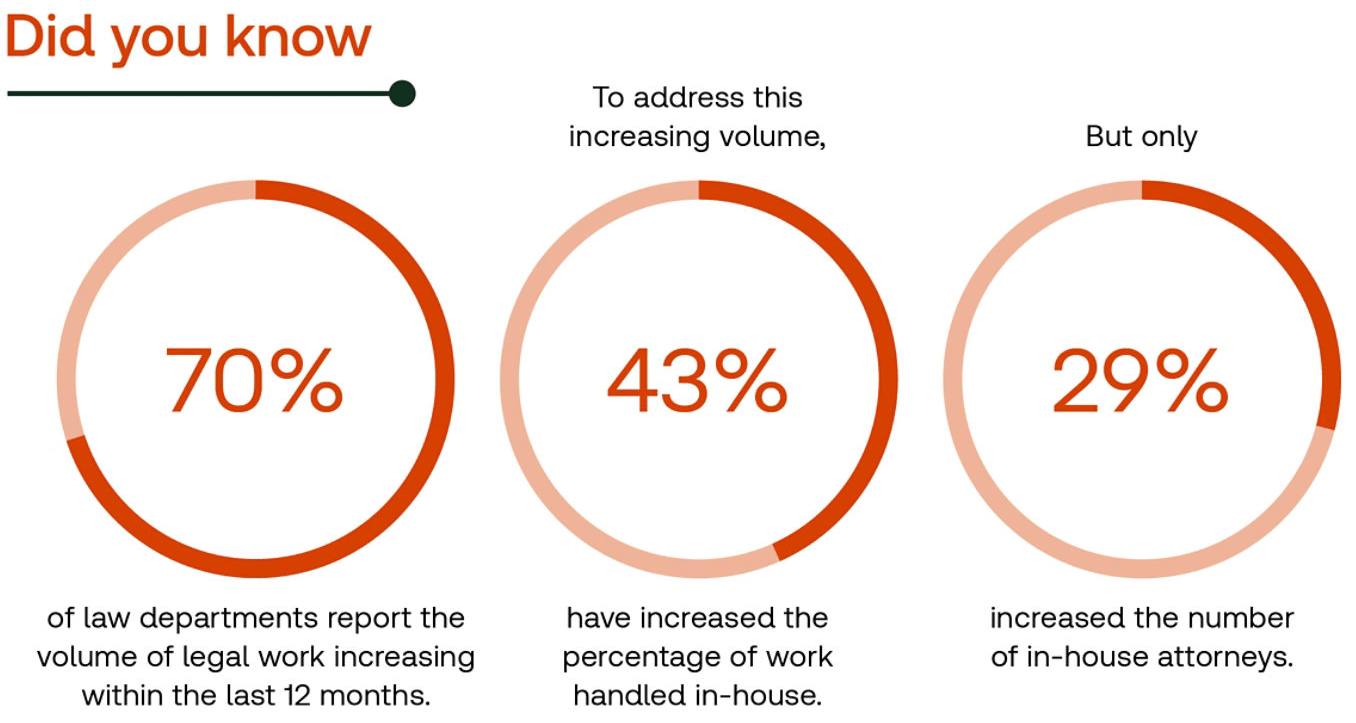Deliver superior value to your business
With 70% of law departments reporting an increase in their workload over the next 12 months, there is a natural concern about how to manage all the workload. Especially as 43% are taking on more of the work in-house but only 29% are able to increase the number of attorneys handling the work, according to the 2023 Legal Department Operations Index Report from Thomson Reuters.
Jump to ↓
| The modern law department: The ideal state |
| What law departments have told us |
| The current state |
| The blueprint |
| Deliver superior value |
For many law departments, the answer isn’t simply piling the added workload onto an already overworked staff. Instead, they are looking at evolving into the “Modern Law Department.” These departments make sure that they are aligned with the business goals and strategies. They put tools and processes in place to be sure that they are doing the work efficiently. And they make sure their attorneys are truly equipped to handle more work in-house.

The modern law department: The ideal state
The company
The law department attorney in the Modern Law Department must understand and align his or her legal services with the business goals of the organization and demonstrate the law department’s contributions to those goals. Depending upon the goal, this demonstration could be either qualitative — surveying key stakeholders on law department performance — or quantitative — analyzing outside counsel rates. Leveraging the right legal technology allows Modern Law Department attorneys to be data-driven and proactive, so they can consistently provide superior value.
If you’re like most corporate counsel, you’re probably wondering if it’s truly possible to deliver superior value when you’re constantly doing more and more with less and less, when you’re never fully confident in your legal information as you face unfamiliar matters, and when you must continue to develop and execute both legal and business initiatives. Given these many disparate demands, is it possible to build the Modern Law Department?
Legal operations
As a general counsel today, it’s not enough to drive down legal costs and to manage efficient legal workflows. If you want to truly build a high-performing law department and deliver superior value, you must simultaneously address several essential areas.
The Modern Law Department strategically uses legal technology in legal operations, specifically to:
- Automate routine administrative tasks like tracking down updates from law firms, checking invoices for billing guideline violations, and approving invoices
- Have visibility into all aspects of a matter, from initial intake to final invoice
- Easily communicate and collaborate with outside counsel
- Manage current and predict future spend
- Use data analytics to demonstrate the value of the law department
By leveraging the right legal technology, including emerging generative artificial intelligence (GenAI) tools, legal operations run more efficiently and effectively, thus freeing up the corporate attorneys’ time for higher value activities.
The practice of law
The practice of law is the bread and butter of the corporate legal team and is certainly the area where you have to deliver consistently and with excellence. As the variety and volume of matter types grow, Modern Law Departments look to new tools to be sure they are able to consistently have confidence in their legal work — even in unfamiliar matters.
That confidence comes because they know that they found the most reliable, most current legal information quickly and easily and that this legal information was properly interpreted and then skillfully applied. They see that they were able to help mitigate risk for the organization and free up more time to serve as the organization’s trusted advisor.
What law departments have told us
In the 2023 Legal Department Operations Index conducted by the Thomson Reuters Institute,108 law departments, with 38% having more than $1 billion in revenue attorneys ranked their highest priorities.
Here are their top eight priorities:

The current state: 3 challenges to delivering superior value
Law departments like yours may be working diligently to address these issues; unfortunately, they have remained counsels’ top concerns for the past several years. So, what is preventing most general counsel or legal operations professionals from successfully addressing these issues to build that Modern Law Department so they can deliver superior value?
Challenge #1: Quantifying the law department’s contribution to the business
Trying to manage a combination of separate technologies and various manual methods reduces the opportunity for law departments to be more productive and effectively manage spend. It also prevents law department leadership from acquiring the data needed on matter cost, time spent on matters, overall spend, and other metrics, so they can quantify the law department’s contribution to the business.
This quantification is a key column of Modern Law Departments. Innovative corporate law departments harness technology for more than managing workload. For them, legal technology also supplies analytical tools, provides predictive capabilities, employs early warning systems, and helps track compliance. These tools give them deep insights that transform their work from managing the status quo to exceeding stakeholder expectations and delivering superior value.
Challenge #2: Creating efficient legal workflows and managing spend
In the 2024 State of the Corporate Law Department report, 76% of respondents said that using technology to simplify their workflows is a high priority. This is a big jump from the 2018 version of the study, where just 41% of law departments surveyed said that technology was key to helping address an increased workload.
Technology is key to building the Modern Law Department, however, not just any technology. And herein lies the problem with the current state. Law departments have leveraged separate technologies, such as email, document management, and e-billing, in an attempt to create more productive workflows and manage spend. However, because each technological solution is separate — and frequently combined with manual methods like paper filing — the law department achieves neither workflow productivity nor spend management.
GenAI creates even more opportunities for law departments to modernize. GCs surveyed for the State of the Corporate Legal Department report view GenAI as the most likely area for transformational change in the legal profession. In fact, 42% said that they anticipate AI to transform the legal profession.
 | TRI Report2023 State of the Corporate Legal Department |
Challenge #3: Solving the “know how” problem
Even if you’re a master legal researcher, conducting legal research is challenging because you work within a dynamic legal landscape made more complex by ever-changing case law, regulations, and government policy, often across multiple jurisdictions. It’s difficult to stay abreast of matters familiar to you, much less in those that aren’t.
If you’re like most corporate counsel, you’re not always fully confident you’ve uncovered everything you need in your research, especially in matters new to you. In our experience at Thomson Reuters, some of the questions corporate attorneys like yourself commonly ask include:
- What did I miss?
- Am I asking the right questions?
- Is my information up to date?
- Is there a better resource?
- Is the argument I am making the best argument to be made?
- Have I addressed my argument’s weaknesses?
When you spend too much time working on a matter, when you’re not confident that you’ve uncovered everything relevant, when the rules frequently change, and you constantly find yourself on unfamiliar ground, you are unable to sustain efficiency and productivity.
Even if you know your legal understanding is sound, how do you interpret and apply it to the matter at hand, especially when that matter is unfamiliar to you?
Well, you could engage outside counsel. Unfortunately, this option is not always viable, due to static or shrinking law department budgets. In the 2023 Legal Department Operations Index report, 26% of law departments reported their budgets decreasing while 40% reported their budgets remained flat. Only 34% reported their budgets increasing.
 | Download your copy of the 2023 Legal Department Operations Index for more insights on how your colleagues are approaching the Technology Conundrum. |
In addition to shrinking or static budgets that many law departments are facing, there are two other issues: volume of work and in-house attorney head count.
In this same report, 70% of law departments reported their volume of legal work increasing. To address this increase, 43% have increased work brought in house with 29% increasing the number of in-house attorneys. Only 47% of law departments have increased outside counsel spending.
However law departments address the increase in workload, they all face the “legal know-how problem.” Solving the legal know-how problem means you are consistently confident in the legal information you use in a matter (knowing) and then you can confidently interpret and apply that legal information to that matter (knowing-how).
The blueprint for building the modern law department
The challenges facing today’s corporate law departments are formidable, but not insurmountable. Cost pressures, changing regulatory requirements, demand for digital change, challenges attracting and retaining the appropriate talent, and willingness to outsource certain functions are all top-of-mind for law department leaders.
The good news is, high performing law departments can get ahead. The 2024 State of the Corporate Law Department report from the Thomson Reuters Institute found that high-performing law departments deliver superior value by maximizing their organizations’ success and by providing long-term shareholder value. That’s a strong case for evolving into a Modern Law Department.
The four columns of the Modern Law Department
Think of the Modern Law Department as a building anchored to a foundation and supported by columns. First, let’s look at the columns:

Column #1: Focus on legal operations
Legal operations is the professional discipline within the law department that includes: project management, legal technology, legal information management, education, outside counsel management, training, and innovation. Given these elements are in addition to the actual practice of law within the law department, it’s no surprise that this scored so highly in the list of law department priorities.
According to the 2023 Legal Department Operations Index report, overall legal operations staff numbers are relatively low, with companies under $500 million averaging 4.4 legal operations staff and large businesses – over $10 billion – averaging just 5.7. This may be because legal operations work is often completed by colleagues who don’t have a formal legal operations title but incorporate the work into their other duties.
Aligning your legal operations goals with the company’s overall strategy and goals will help keep the team focused and ensure you have support from leaders outside the department as you modernize your approach to operations.
Column #2: Execute efficiently and effectively
Central to any legal operations function — whether a legal operations professional is involved or not — is the right legal technology. This includes the management of matters, spend, and legal information. Increasingly, these types of tools incorporate some degree of GenAI to boost effectiveness and efficiency.
With the right legal technology, law departments gain visibility into every stage of a matter, from initial intake to final invoice. This technology also supports communication with partners both inside and outside the law department. Lastly, this technology gives corporate counsel ready access to the most current, accurate legal information supported by expert guidance with checklists, practice notes and toolkits, and expert application through automated model documents and contracts.
With the right legal technology, you can simplify workflows and automate manual processes, enabling corporate counsel to work efficiently and effectively. With the right technology, accurate data drives decision making. These are some of the hallmarks of the Modern Law Department.
Column #3: Control spend
The right legal technology also allows law departments to control spend, tracking the current budget and each matter, and enabling predictive spend on future matters based upon historic spend data.
The State of the Corporate Law Department report found that two thirds of corporate law departments intend to seek greater discounts on law firm rates in the coming year. While not every department has the same leverage, data can absolutely help strengthen your bargaining power.
With the right legal technology, law departments can negotiate rates with outside counsel and effectively allocate the legal workflow between in-house and outside counsel. Having visibility into past spend gives corporate counsel higher confidence as they create future budgets.
Lastly, the right legal technology enables corporate counsel to make decisions involving their legal operations using data, analytics, and benchmarking. This improves law department value, demonstrates efficiency and productivity, and helps the department deliver higher-quality outcomes, such as minimizing risk and maximizing commercial gain for the business. Consequently, corporate counsel build greater credibility for the law department with internal partners, including procurement, finance, and other key divisions.
Controlling spend and making data-driven decisions are essential in building the Modern Law Department.
Column #4: Focus on data privacy
The right legal technology will also secure sensitive legal data, ensuring data privacy. It keeps corporate counsel up to date on the latest standards, regulations, and data privacy research, even across jurisdictions.
What this means to corporate counsel is that they can mitigate risk to their organizations by helping their stakeholders better understand and enforce data privacy requirements.
Data privacy is a key to building the Modern Law Department.
The Foundation
The foundation of the Modern Law Department is the right technology that supports efficiency and effectiveness within legal operations and the practice of law in key areas including:
- Workflows
- Matter management
- Legal information
- Acquisition
- Interpretation
- Application
- Control of spend
- Data privacy
By selecting the right legal technology to improve legal research, streamline workflows, manage spend, and quantify the law department’s contributions to the business while ensuring data privacy, you will have a strong foundation for building the Modern Law Department.
The modern law department: Designed to deliver superior value
So you’re ready to evolve into a Modern Law Department. Here are some suggestions for getting started.
- Quantify the law department’s contributions to the business: Track matter spend to budget, receiving customized alerts to flag spend issues. Easily access matter spend history to reliably forecast future budgets and to create reports for internal partners. Use industry analytics and custom dashboards to show your stakeholders the metrics that they need and that show the law department’s value to the business. Your solution: Legal Tracker Advanced
- Streamline legal workflows and manage spend: Automate the matter intake process and have visibility into all of your matters, including matter budget and spend. Manage and automate your invoice billing guideline violations, approvals and payment. Easily communicate with partners both inside and outside the legal department. Your solution: Legal Tracker Advanced
- Improve legal know-how: Stay on top of the latest legal developments and changes in state and federal regulations across jurisdictions. Get access to expert, easy-to-use legal guidance on any matter in the form of practice notes, checklists, and toolkits. Your solution: Practical Law or Practical Law Connect
Although it is true that the Modern Law Department is driven by data, quantitative metrics don’t tell the entire story. That’s because there are higher-level goals for the business — like stakeholders’ evaluation of the law department’s performance — that can only be measured qualitatively.
Below is a chart of goals to be assessed, the metrics used to assess them and the tools to collect the appropriate data to measure that goal.
| Law department goal | What’s measured | Suggested tool |
|---|---|---|
| Working quickly and efficiently | Cost per matter ($) Hours per matter (vol) Turnaround time (# of days) | Spend and matter management |
| Assessing the legal requirements | Setting expectations and giving clear instructions | External lawyer survey |
| Communicating and managing expectations | Communicating effectively | Business stakeholder survey External lawyer survey |
| Minimizing commercial risk | Value of exposure avoided or mitigated | Risk management powered by AI |
| Aligning with the business strategy | Understanding business strategy and objectives | Business stakeholder survey |
The next step
Businesses place great demands on law departments these days, with a growing volume of legal work and increased requirements to report out and manage to budget. The business landscape is constantly shifting, and legal departments that operate as good business partners need to shift along with it. GenAI has opened new opportunities for efficiency and effectiveness, but in the short-term it can make department operations seem even more complex.
These demands interfere with doing higher value work: serving as the trusted legal advisor to the business and delivering superior value. This work requires having the time to devote to thoughtful reflection, so as to make informed decisions and to offer prudent advice.
But time for such higher-value work will continue to become scarcer, as the demands are unrelenting. The only viable solution is to evolve into a Modern Law Department, This means relying upon the right legal technology, enabling corporate counsel to reclaim the time by automating routine tasks and by doing legal work more efficiently.
Ready to transform your legal department into a high-performing, Modern Law Department? Discover how Thomson Reuters’ solutions can help you streamline workflows, manage spend, and deliver superior value at Thomson Reuters General Counsel Solutions.











